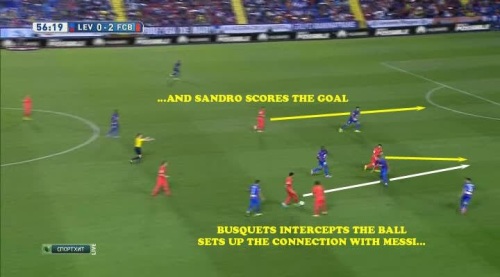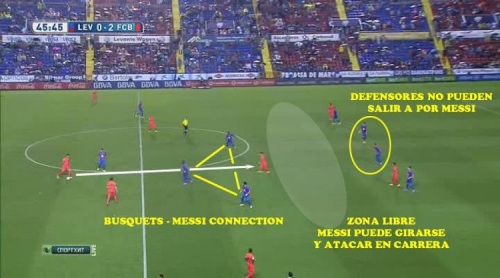With another episode of Revista De La Liga in the can, this is an opportunity for Graham to expand on some of the issues discussed in the bar.
In the company of Scott Minto, Guillem Balague and Terry Gibson, he reflected on the possible dropping of Iker Casillas and the impact of Ivan Rakitic at Barcelona.
Here we dig a little deeper into those two issues.
There was lively discussion in the Revista bar about the report in Spanish newspaper Marca that Iker Casillas may be dropped for the Elche game tomorrow [Tuesday] night. So long as Marca’s story is correct, is it the right call by Carlo Ancelotti to drop his No.1 goalkeeper?
I’ve got a particular allegiance to Casillas not because of friendship or experiences shared, but because he has always been an idiosyncratic goalkeeper who represents something from a slightly different age. One of the reasons he didn’t fit with Mourinho is that Mourinho believes the more detailed and scientific your preparation, the more likely you are to succeed. And his record shows there is a lot in that.
If I saw a player beginning now the way Iker has constructed his career, it’s likely that I would be saying ‘You can become more mechanical, more invested in the percentage actions coming off for you’. But he’s got where he’s got to based on very hard work, very great talent, but something else that comes up in the Spain book…
Back at Euro 2008, Jose Manuel Ochotorena, the Spain goalkeeping coach, made it clear that they had all the information to tell Iker what he needed to know about the Italian penalty takers [in the quarter-final, which Spain won 4-2]. And Iker said ‘No, leave me’. Ochotorena walked away knowing that Iker had to go into his zone. He thrives on instinct. He has become San Iker – Saint Iker – because of going into a zone in moments of high pressure; something innate comes out.
That innate part of Iker Casillas has been chipped away at so much over 50-plus league weeks out under Mourinho and Ancelotti, plus the jeering from fans he thought should be devoted to him, then the enormous psychological and spiritual cost of winning La Decima last season then the humiliation of the World Cup. If you base yourself on planning, science and technique, then you have things to fall back on that are not simply ‘do you feel well in yourself’.
Right now, if you look at Casillas’ form, this season he has been mostly faultless for the goals that Real have conceded. Sir Alex Ferguson made decisions in his career which were strategic, soaked with years of experience and included risk. At the end of it, when he had won the trophies to prove he was the best, he identified that taking the decisions that others were scared of was fundamental to him.
If Marca are right and Iker is to be dropped, then while I will remain an Iker supporter and sympathetic to what has happened to him and the way in which he has been undermined, I will certainly understand that Ancelotti is trying to lance a problem at a time when his team have scored 13 goals in two games; that has given him the breathing space to look analytically and say ‘We’ve won the last two. I can argue that Iker is not being blamed but I’m going to take a brave, big decision’. For that reason, IF Ancelotti goes ahead with [dropping Casillas], I’ll be more supportive and more analytically appreciative of it than I would have been otherwise.
We talked about the positive impact Ivan Rakitic has had on Sergio Busquets, but how big an influence has the Croatian been in helping Barca recapture something of the high-tempo, hungry elements which defined the start of Pep Guardiola’s reign at the club?
Xavi said that the atmosphere, work ethic and ‘feeling’ reminded him of the beginning of the Pep era. I think it’s been reported as him saying ‘the team is playing Pep style football’, but it was more like an old-fashioned weatherman sniffing the air and saying ‘it smells like rain’. I think that is your first marker that things are tighter, healthier, more focused, intense and unified.
I would argue that across the span of the Pep years, if we are comparing the very early months of Luis Enrique, the span began in a pretty blue-collar manner. The treble, exciting as it was, was a very gritty year. They played lovely football but it was based upon some wins which were pretty gnarly – the win away at Donetsk, the 3-2 win against Betis, the bare-knuckle 2-0 Clasico win, the 3-3 draw with Villarreal towards the end of the season when Iniesta gets injured, then hauling themselves back into it in the last seconds against Chelsea – there was just a sleeves-rolled-up, everybody-in-it-together element which I think doesn’t compare to the football apogee of the Pep years, which would probably be the 2011 final and the World Club final against Santos.
That arc began with blood, sweat and tears and I think what we are seeing across the board now is an influx of new blood, new enthusiasm, players who are thrilled to be at Barcelona. I look at Vermaelen’s work to get fit, I look at Sandro, Munir, Mathieu and undoubtedly Rakitic, and you see guys who would have given anything to be bought by Barcelona and paid massive money to be there.
In terms of the work ethic, there’s an important connection [between the two eras] in the manner of making every second of the working day count. Luis Enrique has re-instituted the breakfasting together at the training ground, the absolute intensity of every minute in training – there’s a correlation between that and this group of players separating themselves from the other blue-collar teams in La Liga who want to frustrate, stifle and outwork them.
Rakitic embodies all that is good. He looks like he can’t believe his luck. He spoke at length about having turned other teams down and that would have included Real Madrid; the brand of football is exactly what he lives for, but there is his willingness to be defensive, to be the pivote, to allow Busquets time to push forward.
[Against Levante], when he clears the ball from the back-post area with a brilliant, saving tackle, if you look at him as he is racing back, he has taken a little look over his shoulder to see where the Levante player is rather than just focusing on the ball and how he is going to clear it. That’s the run that Busquets would have had to make over the last two seasons. Exceptional though he is, Busquets is not as quick as Rakitic. There will come a stage in the season when Barcelona will have to rotate Rakitic – as they did in midweek against Apoel – because of the amount of ground he is covering.
In the Athletic game, there is a fabulous Busquets pass to Messi, who then passes to Neymar to open the scoring. That’s Busquets in an advanced position playing a first-time ball. [Against Levante], Busquets plays in Messi for Sandro’s goal (see below). These are the types of exquisite jobs he was able to do less and less because of, not simply having to cover for Xavi who was letting players go past him because he couldn’t get back, but mentally his concentration had to be ‘what’s happening to my right-hand side?’. He already knows he doesn’t have to be like that and it has been liberating in terms of his interceptions, one-twos and his creative use of the ball going forward. That’s why I’m convinced we are getting the most efficient and enjoyable version of Busquets we’ve seen for maybe three years.
Images are the copyright of BarcaLogia (@barcalogia)









